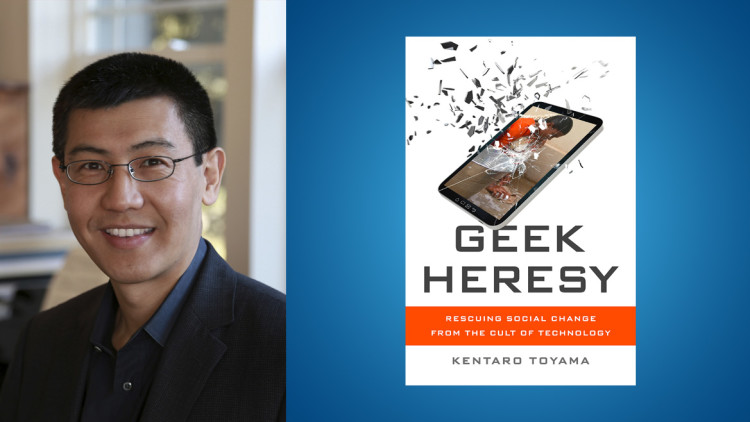“3 Questions For” is an ongoing series of quick sketch interviews with notable presenters at MDC events.
Kentaro Toyama is W. K. Kellogg Associate Professor at University of Michigan’s School of Information and a fellow of the Dalai Lama Center for Ethics and Transformative Values at MIT. Until 2009, he was assistant managing director of Microsoft Research India, which he co-founded in 2005. He is also co-editor-in-chief of the journal Information Technologies and International Development. In his latest book “Geek Heresy: Rescuing Social Change from the Cult of Technology,” Toyama cures us of the manic rhetoric of digital utopians and reinvigorates us with a deeply people-centric view of social change. Kentaro will be appearing at the Miami Book Fair in Intersections: Technology and Culture on Saturday, November 21 at 10:00 a.m.
Gabriel Riera: “Heresy” is a loaded word. For centuries, it was a dangerous and inflammatory way to describe a person, belief system or intellectual pursuit. What is the heresy you refer to in the title of your book, Geek Heresy?
Kentaro Toyama: A “geek” is someone who makes a fetish of technology, and these days we are all geeks, literally going to sleep with our gadgets. Among the high priests of our geek culture is a belief that there is no problem too large that some brilliant technological innovation couldn’t solve it. For example, we have Mark Zuckerberg saying the following about global inequality: “The richest 500 million have way more money than the next 6 billion combined. You solve that by getting everyone online.” The heresy of the book argues that this techno-utopian orthodoxy is wrong. Technology is not our salvation.
Social challenges require human solutions first and foremost.
GR: Why did you write this book — what are you hoping to accomplish?
KT: Technology is amazing, but what it actually does for the world’s persistent social problems is very limited. Social challenges require human solutions first and foremost. And, as the examples in the book show, it is actually not that hard to see this with a little bit of critical thinking applied to things that everyone knows. For example, we have all seen children playing with smartphones. What are they doing? They’re not doing math problem sets or writing composition papers. They’re playing Angry Birds. If so, why do we keep thinking that more digital technology in schools will improve learning?
My hope is that as more people understand what technology does and doesn’t do for society, that they will stop being distracted by technological non-solutions and get on with the hard work of causing real social change through human engagement.
GR: You make the point that technology is only an amplifier of human conditions. If technology doesn’t save us, what will?
KT: The American founding fathers didn’t ask this question. Though they were products of the Enlightenment, during which there was a burst of technological advancement, they still felt that getting governance, economics, and education right was the important thing. That is true all the more today. If you accept that technology amplifies underlying human forces, then in a world of incredible technologies, it’s all the more important that we get the human forces right. The more powerful the engine, the more important it is that the driver is careful and knows where she’s going.
